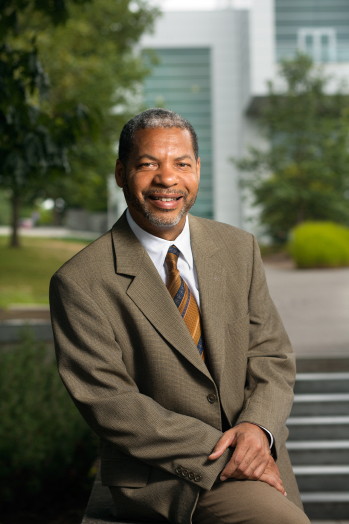END NOTE
A landmark appointment that advanced pace of inclusion on campus

Lance Collins, dean of Cornell's College of Engineering. See larger image
I still recall the question that an engineering college staff writer asked during an interview for an article in our college's magazine: "Are you the first African-American dean of engineering?"
I had no idea. The magnitude of being selected dean had completely eclipsed this question, so to my dismay my somewhat embarrassed response was simply that I did not know. The answer was even more profound: I was the first black dean at Cornell, ever.
How is it that we had to wait for this landmark until the second decade of the new millennium? And yet, if I consider how the world looked to me as a child, this is remarkably fast, not slow, progress.
I grew up in a middle-class Long Island suburb. Neither of my parents was college educated; my father was a furniture maker and my mother was a homemaker and occasional crossing guard for the local elementary school.
At the beginning of each fall, my mother would ask me to list the students in my class. Invariably they were different from the year before, which elicited a response I remember to this day, "Vin, get the car, we're going to speak to the principal."
In those days it was called "tracking," an insidious practice of putting students of like abilities together for the sake of allowing the gifted to reach their potential unencumbered by slower students. By and large, whites were placed in the "A" track and blacks in the "B". These tracks were not publicly announced, so my mother's question was designed to prevent what she considered the inevitability of my switch from the A to the B track. She successfully fought this each year, telling the teachers and principal that my parents would manage any "frustration" I would supposedly experience in keeping up with the faster-paced class. How daunting it must have been to be non-college-educated parents standing up to the school system that made, on the surface, rational decisions based on its best judgment of aptitude and talent.
Diversity back then was called "affirmative action," a term long since abandoned for its implications of reverse discrimination. Indeed, the original intent of affirmative action was to rebalance an unbalanced world that, at the time, had difficulty disentangling merit from race. Today the word "diversity" is all about inclusion – and at Cornell that means creating a microcosm of the complex world in which we live. It's about the benefits to our community and society that result from having multiple viewpoints, experiences and approaches represented, rather than reparations for the past. It is forward looking and exciting.
Recently I hosted undergraduate campus leaders at a barbecue in my backyard. Mother Nature decided to drench our affair, but fortunately a sturdy tent provided ample cover. The students, undeterred by the soaking rain, showed up in force – every ethnicity, race, creed, color and gender were well represented. The conversations were lighthearted and fun, and the students clearly enjoyed each other's company.
They weren't there as representatives of their ethnic background, religion or gender, which is fine with me. They were just students, reflecting on the challenging year that had passed, their nerves about upcoming finals, plans for the summer or their future careers. They were Cornellians taking a break from their studies.
No, the College of Engineering has not yet met its goals in creating a truly diverse society. But as dean of engineering, I can say that the benefits of the progress we have made thus far are self-evident. Onward!
Lance Collins became dean of engineering in 2010. He earned a B.S.E. in chemical engineering at Princeton University in 1981, and an M.S. (1983) and Ph.D. (1987) at the University of Pennsylvania. He taught for 11 years at Pennsylvania State University, coming to Cornell in 2002, where he served as director of graduate studies for aerospace engineering from 2003-05. He was director of the college's Sibley School of Mechanical and Aerospace Engineering from 2005-10.